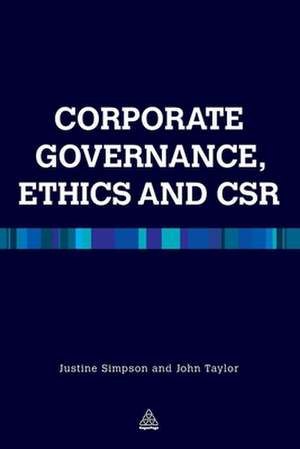Corporate Governance Ethics and CSR
Autor Justine Simpson, John R Tayloren Limba Engleză Paperback – 2 ian 2013
Preț: 399.21 lei
Nou
Puncte Express: 599
Preț estimativ în valută:
76.39€ • 79.92$ • 63.46£
76.39€ • 79.92$ • 63.46£
Carte tipărită la comandă
Livrare economică 02-16 aprilie
Preluare comenzi: 021 569.72.76
Specificații
ISBN-13: 9780749463854
ISBN-10: 0749463856
Pagini: 296
Ilustrații: Illustrations
Dimensiuni: 158 x 234 x 15 mm
Greutate: 0.42 kg
Editura: Kogan Page
ISBN-10: 0749463856
Pagini: 296
Ilustrații: Illustrations
Dimensiuni: 158 x 234 x 15 mm
Greutate: 0.42 kg
Editura: Kogan Page
Cuprins
Introduction
01 The need for trust
Introduction
Is trade free?
A wider moral imperative?
The history of the company
Limited liability
Ownership and control
Moral hazard
Shareholder objectives
Institutional investors
Institutional investor organizations
Fiduciary capitalism
Agency theory
Agency costs
Stakeholder theory
The power of modern management
The public sector
02 Corporate culture
Introduction
What is ‘corporate culture’?
Visible aspects of culture
Sociability versus solidarity
Sub-cultures and counter cultures
Organizational climate
Corporate morality
Tone at the top
Ethics in the workplace
Corporate culture
The public sector
Ethics in the public sector
03 Ethical behaviour
Introduction
Ethical theories
Aspirations and attitudes
Individuals in organizations
Motivation and the role of corporate culture
Socialization
Group attractiveness
Socialization techniques
Groupthink
Identifying groupthink
Rationalizing unethical behaviour
Dysfunctional acts by individuals
Preventing unethical behaviour and the role of management
Ethics and the HR department
Whistleblowing
Bribery Act 2010
04 Principles of corporate governance
Introduction
History and background of corporate governance
The link between corporate governance and ethics
Definition of corporate governance
Reports that have been produced in relation to corporate governance issues
Key concepts and principles
The relative merits of a framework approach to corporate governance verses a regulatory approach
The role of the audit function
05 The role of the senior executives/board
Introduction
The responsibilities of directors/senior executives
The importance of ethical behaviour for senior management
The structures of controlling boards
Alternative board structures
The role of the chair
The role of the CEO
The role of non-executive directors and the importance of their independence
The need for and structure of sub-committees
06 Assessing performance and remuneration of directors and senior executives
Introduction
Assessing the effectiveness of directors
Goals and objectives
Performance evaluation
Corporate governance and directors’ pay
Greenbury and the remuneration committee
Accounting requirements
Non-audited information
Audited information
Executive pay: revolt of the shareholders
Excessive rewards and shareholder rights
International pay and reward systems
07 The audit function
Introduction
Auditing theory
The development of the auditing profession
The role of the external auditor
Conflicts of interest
Globalization
Regulation of the audit profession
Contrast rules-based and framework approaches to regulation
Professional regulation and ethical codes
Sarbox – the American way
Is self-regulation good enough?
Maxwell Communications Corporation
Polly Peck
TransTec
The future of self-regulation
The European Union and regulation
The role of internal audit
Independence
The public sector
The audit committee
08 Corporate governance and other stakeholders
Introduction
Definitions of stakeholders
Guidance on stakeholder interests
Internal corporate governance stakeholders
External corporate governance stakeholders
Institutional investors and corporate governance
09 Corporate Social Responsibility and its reporting
Introduction
The growth in importance of CSR reporting
Definitions of Corporate Social Responsibility
What is corporate governance?
What is Corporate Social Responsibility and how does it link to corporate governance?
Historical perspective of Corporate Social Responsibility
The reality of Corporate Social Responsibility
Getting to the bottom of the triple bottom line
Auditors and Corporate Social Responsibility
Social and environmental audits
Social matters
The European Union Eco-Management and Audit Scheme
The International Council of Local Environmental Initiatives
Global reporting initiatives: sustainability reporting guidelines
Ethical Trading Initiative
10 Corporate Social Responsibility, its measurement, models and theories
Introduction
Corporate Social Responsibility measurement
11 Small companies, charities and other not-for-profit organizations
Introduction
Forms of organization
Reporting
Family-owned firms
Charities and social enterprises
The application of corporate governance to charities and small companies
Corporate governance and growing businesses
Problems with adopting corporate governance principles
Institute of Directors guidance
Family councils and family assemblies
The larger family business
Governance and finance
The relevance of Corporate Social Responsibility to smaller organizations
12 Emerging issues
Index
Notă biografică
John Taylor was a Senior Professor in accounting and auditing at Leeds Metropolitan University. He has substantial experience of working as an accountant in the audit profession and was formerly financial director of a company in the clothing industry.
Justine Simpson is a Professor in Accounting Financial Services at Leeds Metropolitan University She teaches professional accounting qualifications and management accounting, project management, forensic accounting and financial management modules on BA Accounting Finance degree and MSc Accounting.
Justine Simpson is a Professor in Accounting Financial Services at Leeds Metropolitan University She teaches professional accounting qualifications and management accounting, project management, forensic accounting and financial management modules on BA Accounting Finance degree and MSc Accounting.






